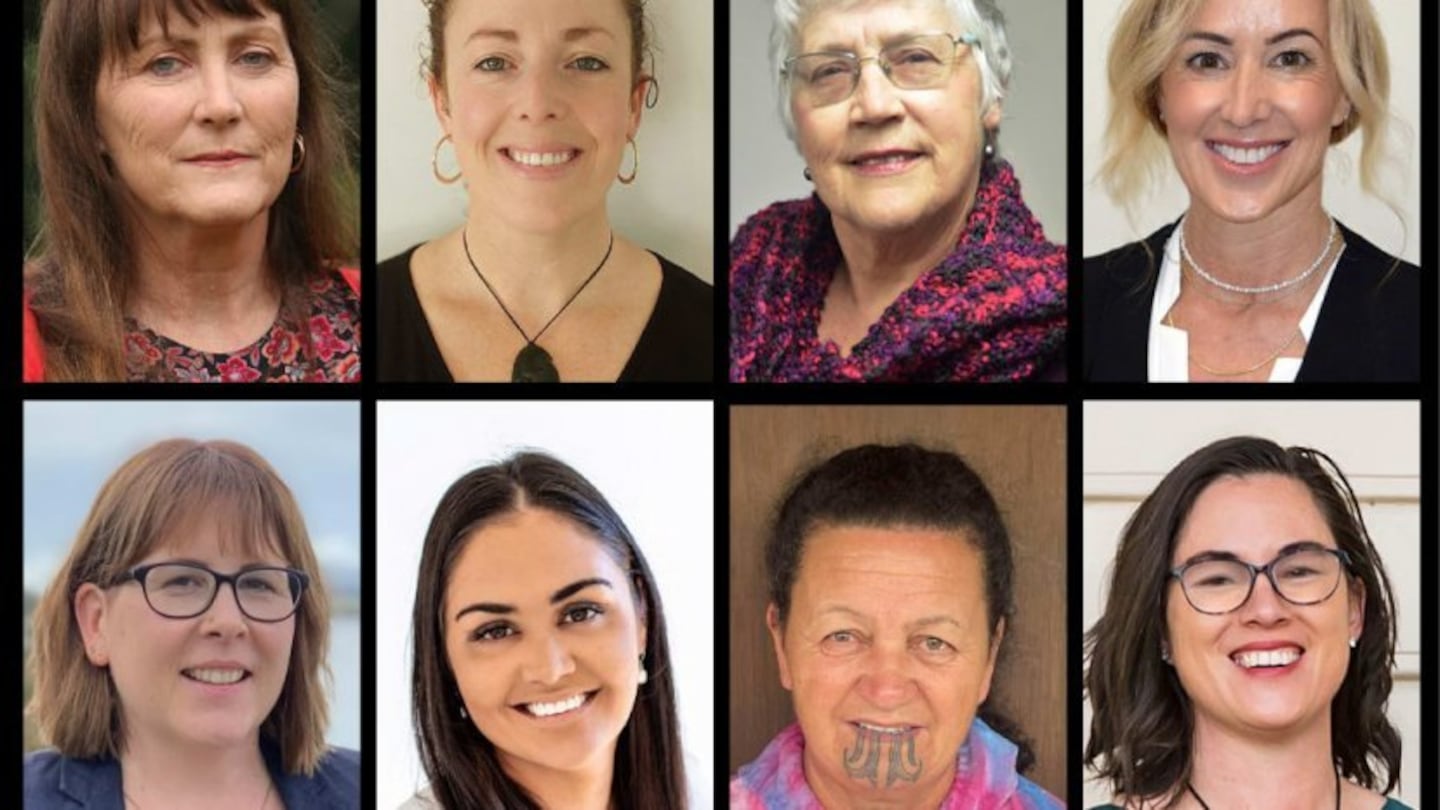Northland has 13 new women local government politicians. Photographed from left (top row) Ann Court (FNDC), Amy Macdonald (NRC), Carol Peters (WDC), Jayne Golightly (WDC); (bottom row) Eryn Wilson-Collins (KDC), Felicity Foy (FNDC), Hilda Halkyard-Harawira (FNDC), Kelly Stratford. The remaining politicians not in the montage are Pera Paniora and Rachael Williams (KDC), Deb Harding and Marie Olsen (WDC) and Tui Shortland (NRC). Photo / NZME graphics via LDR
The number of women politicians across Northland local government leadership has shrunk by almost a quarter in the wake of this year's local elections.
There are 24 percent fewer women in Northland's less-than-week old new term local politicians' lineup.
Former Whangārei mayor Sheryl Mai and Northland Regional Council (NRC) chair Penny Smart were part of 17 women among Northland's 42-strong elected councillors and local government heads for the 2019-2022 term - making up 40 percent of its cohort.
After the 8 October elections, there are only 13 women in Northland's new 44-person local government councils' political leadership - making up 29.5 percent of its cohort for the new three-year 2022-2025 term. At time of publishing, none of these women headed their council.
Mai and her 2013-2016 deputy mayor Sharon Morgan were New Zealand's first female mayor/deputy-mayor team. Smart was Northland's first regional council chair.
Massey University associate professor of feminist history Dr Jenny Coleman said the reduced presence of women in Northland local government political representation was of concern.
"It's appalling. There's a huge difference," Coleman said.
"It's pretty serious for everyone in terms of representation on behalf of their [council] population," she said.
"What does that mean to the power balance around the council table."
The decline in new-term Northland women politicians is part of a tsunami of regional leadership change.
Whangārei District Council (WDC) has experienced the biggest women-on-council decline, this headed with Mai's departure. Women now make up only 28.5 percent of its 14 elected representatives - down from 42.85 percent in the previous term.
Northland has had just three women mayors and one regional council chair.
This week, Mai said there had been a "pretty even" gender split between women and men on WDC during her nine years at the helm. That had provided important balance.
She said it was important to look at what had caused a drop in women standing for council in the 2022 elections. There had been an absence of women candidates in some WDC wards and only one woman among seven WDC 2022 mayoral candidates.
The number of women in politics has also declined at Kaipara District Council (KDC). Women make up only 30 percent of elected representatives, down from 44 percent in the previous term. This decline includes the departure of three-term KDC deputy mayor Anna Curnow.
Outgoing KDC chief executive Louise Miller has been Northland's only woman council chief executive through the last council term. Hers is the fourth and final departure in a 100 percent clean sweep Northland councils' chief executive changeover in the last year.
Meanwhile, women now make up only 36 percent of Far North District Council's (FNDC) elected representatives, down from 40 percent in the previous term. FNDC has four women in its now 11-person lineup - re-elected former deputy mayor Ann Court, Felicity Foy, Kelly Stratford, and newly elected Ngā Tai o Tokerau Māori Ward representative Hilda Halkyard-Harawira.
This could increase by one with the addition of Rachel Smith, who is waiting in the wings to potentially return to council, subject to FNDC mayoralty final vote confirmation
At publication time, Court was in a neck-and-neck mayoral leadership battle. On 8 October, provisional results showed she had 5995 votes over previous-term councillor Moko Tepania's 5750, in a 245-vote majority. On 9 October, once the previous day's last-minute votes had been tallied, their positions had switched in updated preliminary results. Tepania led on 7535 compared with Court's 7288, a lead of 247 votes. Special votes will confirm or overturn the results.
Smith would take Court's place as a Bay of Islands-Whangaroa General Ward councillor.
Meanwhile at NRC, women now make up 22.2 percent of its elected representatives, down from 33.3 percent in the last term. NRC's nine councillors will choose the new council chair at their inaugural 25 October council meeting. Smart failed in her 2022 bid to be re-elected.
Just two of NRC's nine elected representatives are women - re-elected Amy Macdonald and new Te Raki Māori Constituency representative Tui Shortland.
Knife-edge voting in NRC's Bay of Islands - Whangaroa General Constituency on 8 October saw a former FNDC deputy mayor Tania McInnes with a 55-vote majority. That flipped in updated 9 October preliminary results and previous incumbent Marty Robinson being 71 votes ahead, pending confirmed results.
Northland's 13 new-term women politicians are split roughly evenly between returning elected representatives and newcomers. Four of the six newcomers are from Northland's new Māori wards and also include Te Moānui o Kaipara Māori Ward's Pera Paniora (KDC), Whangārei District Māori Ward's Deb Harding (WDC) and Te Raki Māori Constituency's Tui Shortland (NRC).



